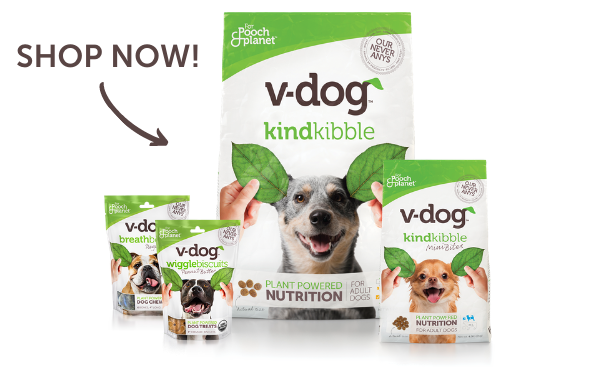Everything You Need to Know About Vegan Dog Food
Interested in switching your pup to a vegan diet, but not exactly sure where to start? We're here to break down the science behind vegan dog food, what it means for your pup's nutrition, and what vegan pet parents are saying about the results.
Vegan Dogs: The Science
Many studies have explored the topic of vegan dogs, looking at their evolution, genetics, and nutritional requirements. Below are some highlights from peer-reviewed journals.

"An experimental meat-free diet maintained haematological characteristics in sprint-racing sled dogs." - British Journal of Nutrition
The study: Compared highly athletic huskies on meat-based and meat-free diets to determine whether nutritional requirements are met with a meat-free diet.
The results: "Haematology results for all dogs, irrespective of diet, were within normal range throughout the study and the consulting veterinarian assessed all dogs to be in excellent physical condition. No dogs in the present study developed anaemia. The present study is the first to demonstrate that a carefully balanced meat-free diet can maintain normal haematological values in exercising dogs."
"The genomic signature of dog domestication reveals adaptation to a starch-rich diet" - Nature
The study: Compared the genomes of wolves and domestic dogs.
The results: "Novel adaptations allowing the early ancestors of modern dogs to thrive on a diet rich in starch, relative to the carnivorous diet of wolves, constituted a crucial step in the early domestication of dogs."
"Amylase activity is associated with AMY2B copy numbers in dog: implications for dog domestication, diet and diabetes" - Animal Genetics
The study: Looked at copy numbers of the AMY2B gene in dogs and wolves to assess amylase activity and starch digestion capabilities.
The results: "Evidence for selection at the entire pathway responsible for starch digestion and glucose absorption indicates that efficient use of energy stored in starch was crucial to the survival and fitness of dogs during the domestication process. Increased amylase activity in dogs relative to wolves is associated with high AMY2B copy numbers in dogs, arguing that efficient starch digestion is linked to high copy numbers at this locus."
"Vegetarian versus Meat-Based Diets for Companion Animals" - Animals
The study: Took a comprehensive look at four previous studies on vegan dogs and cats.
The results: "A significant and growing body of population studies and case reports have indicated that cats and dogs maintained on vegetarian diets may be healthy—including those exercising at the highest levels—and, indeed, may experience a range of health benefits."
Vegan Dog Nutrition

Nutrients vs. Ingredients
Not all diets are created equal, so what exactly should we be looking for in our dogs' diets? "Dogs are biologically omnivorous but can thrive on a balanced plant-based diet," says Dr Armaiti May, DVM. "Animals do have requirements for nutrients, but not necessarily ingredients." She recommends choosing an AAFCO-approved food to ensure that nutrient guidelines are met. These foods are third-party tested for nutritional content to confirm that formulation is complete and balanced. Many plant-based dog foods on the market are AAFCO approved.
This means that nutrients dogs often obtain from animal products, such as protein, taurine, l-carnitine, and vitamin B12, are available from plant-based sources and need not be provided in the form of meat. Vegan dog foods that are AAFCO tested are up against the same nutrient regulations as meat-based foods.
What's in your dog food?
The majority of our meat is produced in factory farms, where livestock are injected with growth hormones and antibiotics, fed GMO-based grain, and live in unsanitary conditions. Unsurprisingly, the meat that makes it to our plates is loaded with contaminants. Taking it a step further, pet food manufacturers use 4-D meat, or meat from animals that are "diseased, disabled, dying, or dead," due to its low cost. These slaughterhouse byproducts (which include all body parts deemed unfit for human consumption, including skin, tendons, brains, intestines, reproductive organs, etc.) are ground up at a "rendering plant" along with other cheap sources of meat (such as spoiled grocery store meat, roadkill, and euthanized animals) to form the base of pet food. These pet foods are often recalled for contamination.
Support from Veterinarians
Many veterinarians support and/or endorse a complete and balanced plant-based diet for dogs (learn more about some of these vets here). Dr. Richard Pitcairn, DVM, began recommending vegan diets for his patients after determining that high levels of toxins were accumulating in their bodies from animal products. "Results outweighed expectations," he says. "Many dogs noticeably improve in their condition with this change alone."
Many of Dr. Armaiti May's canine patients come to her with skin issues and allergies. "Most of the time a dog has a food allergy it is to a meat protein such as beef, chicken, or one of the other common meat sources," she says, and from her experience allergy symptoms typically clear up on a vegan diet.
In addition to allergies, health issues like joint pain, obesity, and diabetes can often be improved on a plant-based diet. Dr. Lorelei Wakefield, VMD, answers common vegan dog questions here.
Anecdotal Evidence

Testimonials
"Lily suffered terribly from digestive issues for YEARS! I even tried a raw meat diet and it didn't help. I was running up my debt in vet and hospital bills because she was sick so often. I finally gave a plant based diet a try and she has been symptom free for almost 2 years." - Brenda C.
"In April 2015, I started Luke on his vegan diet. Since then, he has gone from 5 seizure medications to ONE!!! He also went from an arthritis medication and supplement to NONE! He was a walking zombie on all of his meds, but now Luke runs across the yard, jumps on the bed again to sleep with his mom (which I LOVE!) and gets up the stairs!" - Donna S.
"Hugo was on death's door when I got him. He had incredibly itchy skin and ears. Within just 2 weeks, he is a brand new different dog. The itching and scratching has all stopped! I am in disbelief myself!" - Nadia A.
"Three years ago, Sadie was diagnosed with premature arthritis. She required help just getting up on the couch or bed. I’m happy to report that in that past year, since we’ve changed her to a vegan diet, this soon-to-be 8 year old has bounced back and is stronger and more active than ever." - Lindsay M.
One of the world's oldest living dogs, Bramble the collie, lived to age 25 on a vegan diet. As plant-based dog foods become more recognized and abundant, pet parents and veterinarians are catching on to the various health benefits, including allergy relief, improved mobility and reduced joint pain, weight management, improved energy levels, and skin/coat health. These dogs have excellent blood test results. Read hundreds of other stories from thriving vegan dogs here.

V-dog is a San Francisco-based dog food company that makes animal products without animal products. Since 2005, thousands of dogs of all shapes and sizes have been thriving on our food. Check it out for yourself! Our kibble meets AAFCO requirements and is veterinarian recommended. Learn more about what we do at v-dog.com and check out hundreds of rave reviews on our testimonials page.
MORE FROM OUR BLOG:
Transitioning My Dog to a Vegan Diet: What to Expect
Ask the Vegan Vet: Does my dog need to eat meat?
Source: Thrive Cuisine
Featured image credit: Lifeofpix






